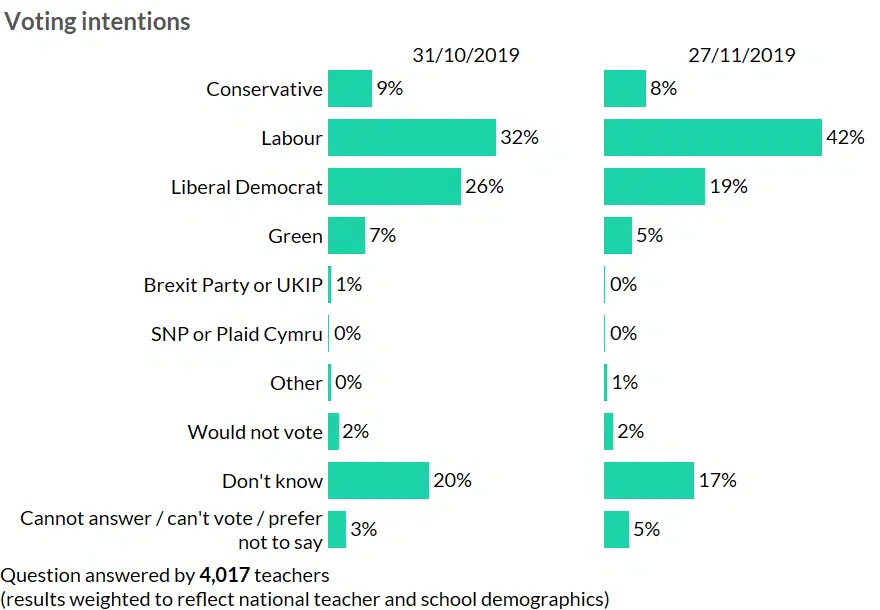We’ve got more fascinating findings this week, but first an announcement…
🏆 Book Vouchers Are Back! 🏆
We love rewarding you for all your hard work using Teacher Tapp. So we’ve resurrected our John Catt book voucher giveaway and made them even easier to earn.
From December 1st, in return for every 100 questions you answer you will receive a £10 voucher to use on a selected range of books from John Catt. It doesn’t matter if you answer those 100 questions as part of a streak or over an extended period of time – simply answer 100 questions on whatever days you can and once done, your voucher will appear (just like the famous Teacher Tapp genie). That said, if you Tapp every day from the start of the offer, your first voucher will be with you before the new year arrives.
Terms, conditions and more info on this exciting offer can be found here. We look forward to rewarding you! In the mean time, this week’s findings…
1. How Will You Vote On December 12th?
After carefully watching teacher voting plans, we’ve seen a marked change in voting intentions between 31st October and 27th November (we’ve only included people who answered on both dates).
There is a huge 10 percentage point increase in Labour’s share of teacher votes!
Looking deeper, votes are switching out from the Lib Dems, the Greens, and some of the ‘Don’t knows’ (though there are still a lot of them). These switchers into Labour are a little younger than average which may suggest the youth/sign-up campaign is working for the reds. The Conservatives have lost a percentage point but that’s within a margin of error. What we aren’t seeing is any shift towards them.

2. What Do Most Teachers Know About Neuroscience?
It’s a source of pride that so many of you read articles about the science of learning on the Teacher Tapp tips page, and we wanted to check-out what you have learnt so far.
A couple of years ago, an academic team showed that many educators, and even people who have studied neuroscience, still believe many neuromyths. In that study they asked dozens of questions, but we wanted to try a few to see how you found them.
The great news is that the vast majority of you got these neuromyth questions correct – your scores were better than the US educators in the academic study!

Teachers in their twenties were slightly more likely to answer the neuromyth questions incorrectly – does this mean that teacher training still isn’t up to speed on the latest neuroscience? 😬

Analysed by subject, science teachers were the least likely to issue an incorrect answer. However, English teachers trailed at the back, which tells us that despite last week’s finding that English teachers read the most educational literature outside of work, they aren’t usually reading about the brain!

3. How Many Primary Teachers Are Subject Leaders?
Primary teachers are skilled generalists, but many still find themselves with responsibility for planning and coordinating a particular subject in their school – with 88% having responsibility for at least one subject.

Many middle and senior leaders are also saddled with subject coordinating duties. Over 40% of them are responsible for more than two subjects. Given you’ve told us that subject coordination typically involves monitoring lessons planning, observing lessons, book scrutiny and leading CPD on your subject, adding those tasks to pastoral and management duties, makes for a weighty workload!

It’s worth adding, however, that SLT typically have a reduction in their timetable to compensate for these tasks. Whereas 45% of classroom teachers with subject responsibilities don’t receive any additional non-teaching time to cover this workload. This is even the case for a stunning 51% of teachers coordinating four subjects!

4. If A Genie Could Grant One Wish, What Would Teachers Want?
We hit you with another of our signature genie questions this week. This time we asked what profession-boosting programme you’d like to see gifted to every teacher in the country. (After all, it’s nearly Christmas!)

The most popular wish was for 3 extra days of CPD/personal time for every teacher in the country. AND YET, when we have surveyed people earlier teachers have said that extra hours aren’t even worth £6.40 to them!
Furthermore, a £1,000 pay rise could be spent on anything of your choice – cars, holidays, but also technology for the classroom or your own CPD, AND YET twice as many teachers picked the £1,000 personal budget for each teacher to spend on their own tech and CPD. Are so many teachers higher tax earners that it’s worth the trade-off?!
A ‘marking assistant’ was the second-highest option, which again shows that teachers instinctively value getting time back (although the link above shows this has lots of extra conditions).

This premium on time becomes more apparent as you scale the leadership ladder, with 50% of headteachers responding in favour of 3 extra days for CPD/personal time. In contrast, classroom teachers were the most likely to wish for £1000 – either as a pay rise, or as an annual allowance for teachers to purchase their own tech and resources. Though the most popular answer was still the 3 extra days off!





